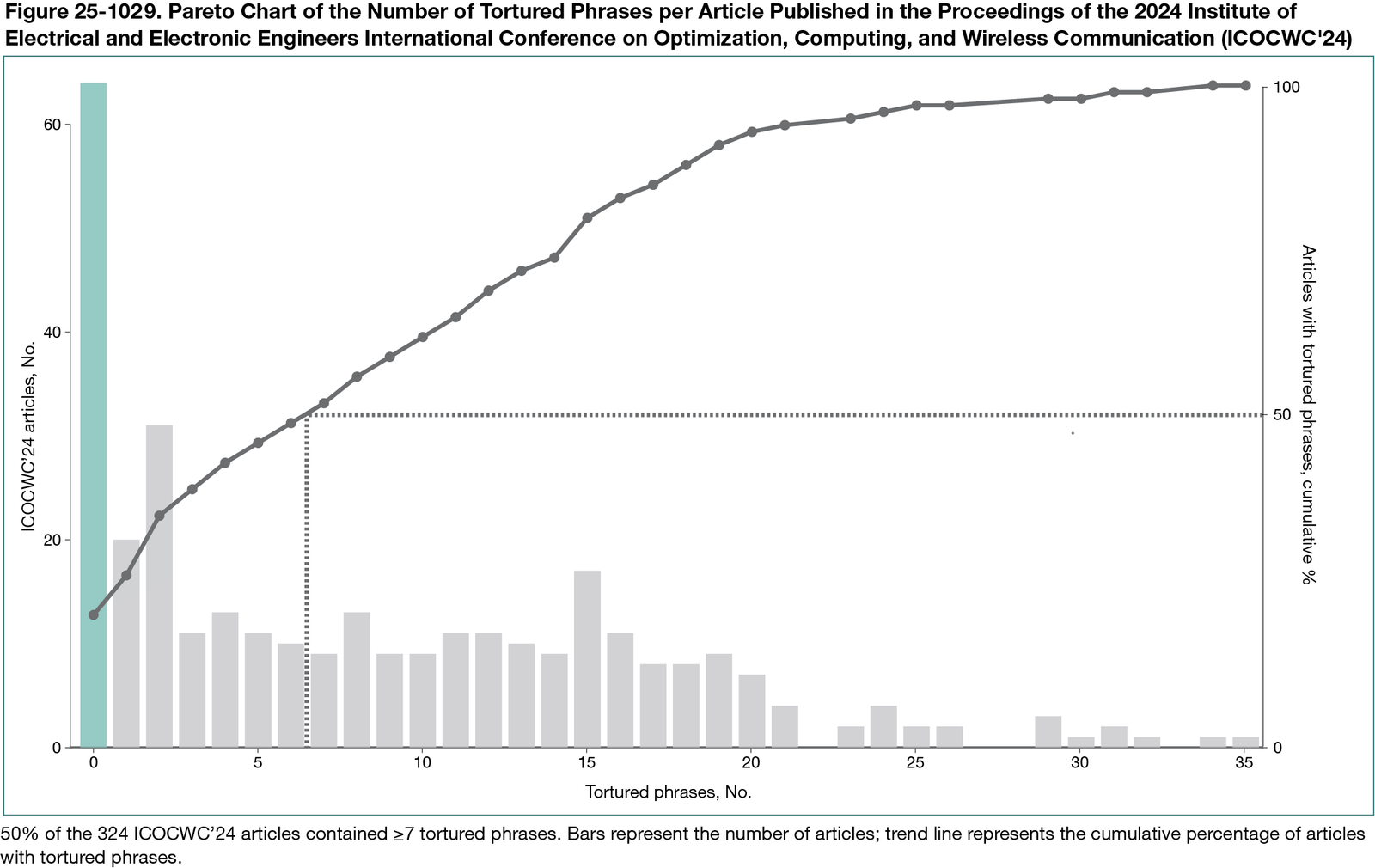Tortured Phrases as a Sign of Possible Misconduct in Proceedings From an Engineering Conference
Abstract
Wendeline Swart,1 Ophélie Fraisier-Vannier,1 Guillaume Cabanac1,2
Objective
Tortured phrases1 in scientific articles, such as amino corrosive instead of amino acid, are potential signals of scientific misconduct. They alter established expressions using synonyms to avoid plagiarism detection. We highlighted the presence of tortured phrases in 1323 conference proceedings and identified the most impacted conference.
Design
We used the Problematic Paper Screener (PPS),2 a tool we developed to detect research integrity issues, to identify conference proceedings published containing tortured articles, defined as articles with 5 or more tortured phrases or fewer than 5 tortured phrases but assessed as problematic by a human. We selected the conference with the largest number of tortured articles and probed with Dimensions (a bibliometric platform) and PubPeer (a postpublication peer review platform) the production of the experts listed in its proceedings. We counted the experts’ numbers of retractions, expressions of concern, and other red flags.
Results
The PPS tabulated 20,066 tortured articles published from 2005 to 2024 by 344 publishers. The conference proceedings subset comprised 7518 articles (37%) mainly published by the Institute of Electrical and Electronics Engineers (IEEE) (6156 [82%]; presented in 1348 conferences), AIP Publishing (648 [9%]), IOP Publishing (364 [5%]), and 12 other publishers.3 The most problematic conference was the IEEE International Conference on Optimization, Computing, and Wireless Communication held in Ethiopia in January 2024, featuring 324 peer-reviewed articles affiliated with India and China only. We identified problematic content in the proceedings using 2 clues: (1) nonsensical text, found in 260 articles (80%) with a mean 11 tortured phrases (Figure 25-1029), and (2) questionable expertise in 2 listed groups. The organizing committee (34 individuals) included 6 persons whose work had been commented on on PubPeer for various concerns on 31 articles, 21 of which have been retracted. Concerns included tortured phrases, suspicion of purchase of an authorship position, plagiarized sections, nonsensical equations, and irrelevant references. The reviewers (134 individuals) included 31 persons (23%) who authored 67 articles that were commented on on PubPeer for integrity issues, 8 of which had an expression of concern and 9 of which have been retracted. Eight reviewers have had several retractions, including 1 reviewer with 3 retractions due to violations of IEEE policy on authorship.

Conclusions
As of February 2025, IEEE tagged with an expression of concern 15 of 260 articles (6%) flagged by the PPS (with a mean of 4 tortured phrases per article) and reported on PubPeer. IEEE had not issued expressions of concern or other corrective labels for articles with more tortured phrases. Limitations of this analysis include the focus on a single conference and the possibility that the PPS may identify false positives or less serious problems that do not require an expression of concern or retraction. However, reassessment may be needed for many of the 20,066 PPS-flagged articles.
References
1. Cabanac G, Labbé C, Magazinov A. Tortured phrases: a dubious writing style emerging in science—evidence of critical issues affecting established journals. arXiv. Preprint posted online July 12, 2021. doi:10.48550/arXiv.2107.06751
2. Cabanac G, Labbé C, Magazinov A. The ‘Problematic Paper Screener’ automatically selects suspect publications for post-publication (re)assessment. arXiv. Preprint posted online October 7, 2022. doi:10.48550/arXiv.2210.04895
3. Swart W, Cabanac G. Year after year: Tortured conference series thriving in computer science. arXiv. Preprint posted online October 17, 2023. doi:10.48550/arXiv.2401.02422
1Université de Toulouse, IRIT (UMR 5505 CNRS), Toulouse, France, guillaume.cabanac@univ-tlse3.fr; 2Institut Universitaire de France, Paris, France.
Conflict of Interest Disclosures
Guillaume Cabanac is the administrator of the Problematic Paper Screener, a public platform that uses metadata from Digital Science and PubPeer via no-cost agreements, and has been in touch with most of the major publishers and their integrity officers, offering pro bono consulting regarding detection tools to various actors in the field, including Clear Skies, Morressier, River Valley, Signals, and STM. No other disclosures were reported.
Funding/Support
Guillaume Cabanac received funding from the Institut Universitaire de France and the NanoBubbles project, which received Synergy grant funding from the European Research Council within the European Union’s Horizon 2020 program (grant agreement No. 951393).
